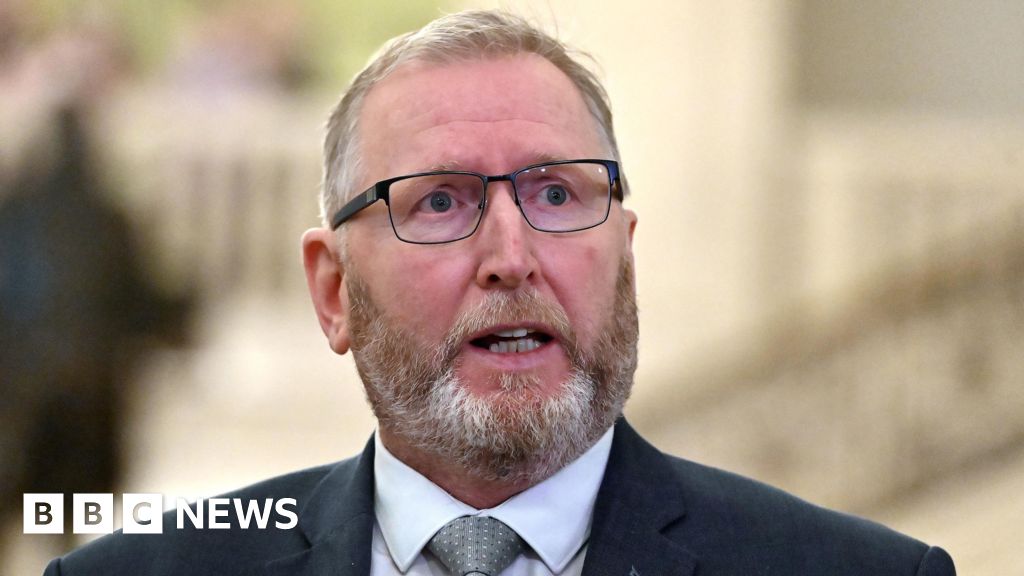
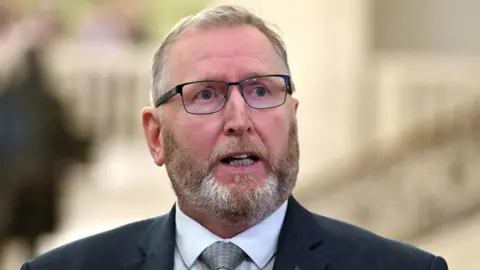 PA Media
PA Media
Doug Beattie has resigned as leader of the Ulster Unionist Party (UUP).
In a statement, he cited "irreconcilable differences" between him and party officers.
Mr Beattie took over as leader of the party in May 2021.
It is understood there have been internal tensions over his role in recent weeks linked to the selection of Colin Crawford as the party’s new North Antrim assembly member.
Party colleague Mike Nesbitt, who is a former leader of the UUP, said Mr Beattie's decision to step down came as a shock.
Mr Nesbitt said the party faced a challenge addressing internal matters.
Asked if he would consider returning as leader, the health minister said he had not given that possibility a "millisecond's thought".
After several difficult electoral performances, the UUP regained a seat at Westminster in July's general election.
Robin Swann's election as MP for South Antrim left his Northern Ireland Assembly seat empty which was filled by Mr Crawford.
In his statement, Mr Beattie said leading the party had been an honour and said there had been "small successes on the back of difficult electoral results with a lot of work still to do".
"It is now clear that some believe the momentum needed to keep the Ulster Unionist Party moving in the right direction cannot come from me," he said.
"Irreconcilable differences between myself and party officers combined with the inability to influence and shape the party going forward means that I can no longer remain the party leader."
He said the UUP would immediately begin the process of selecting a new leader.
The UUP has had three leaders - including Mr Beattie - since Mike Nesbitt resigned in the aftermath of the 2017 assembly election.


Mr Beattie added in his statement that leading the UUP had been at times "lonely and isolating".
"I am no stranger to leadership and that is how it often feels in taking a toll both physically and mentally," he said.
"It also strains friendships and political relationships."
He said that while many colleagues had shown "loyalty and support" there were others who "did not agree with the direction and path I set for the party and the vision I promoted".
A party of warring tribes
By BBC News NI political correspondent Gareth Gordon
Back in the days when it was a much more significant player than it is now a colleague used to refer to the Ulster Unionist Party as “a loose confederation of warring tribes”.
The years have diminished the party in many ways but the description still stands.
Just witness the demise of Doug Beattie as the latest to try - and fail - to return the party to former glories.
He breezed in promising a vision of “A Union of People”.
He couldn’t even manage a union of his own party, which – though we don’t hear as much about the schisms as we did in the UUP of old – they clearly still exist.
Read more here.

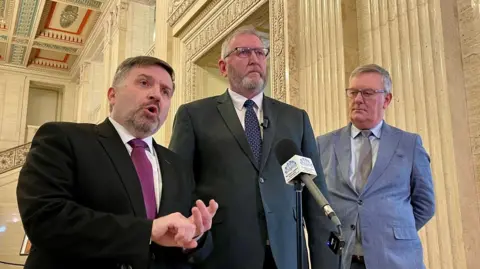 PA Media
PA Media
'Reasonable and positive'
Northern Ireland's First Minister Michelle O’Neill wished Mr Beattie and his family well following his resignation announcement.
“We have worked constructively since he became leader of his party, including during the restoration of the executive and institutions at the beginning of this year," the Sinn Féin deputy leader said.
“I will continue this constructive approach with the new leader of the UUP when they take up post."
The leader of the Democratic Unionist Party, Gavin Robinson, said while he and Mr Beattie "differed over tactics" there was "no doubt that Doug is a committed Unionist who wants to see Northern Ireland remain firmly within the United Kingdom".
The leader of the Social Democratic and Labour Party, Colum Eastwood, said despite his political differences with Mr Beattie, he had "always admired his candour and commitment to working together in the interests of the people we represent".
"I know this won’t be the end of his political contribution but hope he enjoys some more time to spend with his loving family," Mr Eastwood added.
Northern Ireland Secretary Hilary Benn thanked Mr Beattie "for the commendable leadership he has demonstrated over the past few years".
"It is clear that he has always sought to act in NI's best interests and I know he will continue to do so," he said on social media.
What are his constituents saying?
Toni Connor, BBC News NI, in Portadown

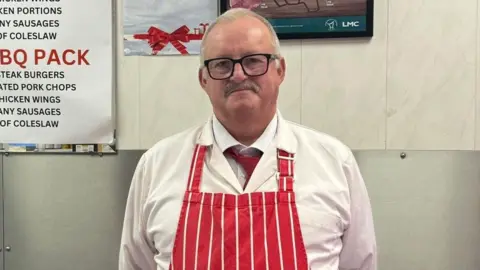
Portadown Butcher Phillip Freeburn said Mr Beattie would be "a great loss for the town he served the town well".
"He especially looked after pensioners. My father is 92 and throughout his years any issues they went to Doug for help and they always speak highly of how much he has done for them.”

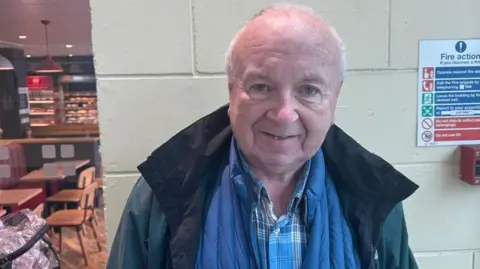
Gary Chambers from Maghery said Mr Beattie was a "straight talking man".
"You could believe what he said," he added.
"The replacement needs to be someone who, first of all, stands by his constituents and someone who is straight talking," he said.
"When Doug decided to do something he always stuck by his guns, always had the union between Northern Ireland and the United Kingdom at his heart and the new leader needs to be fighting to maintain the union,” he added.


Shop owner Jonathan Rodgers said he was "sad" to hear the news.
"I can't think of who will replace him,” he added.
Who is Doug Beattie?
Mr Beattie took over as leader of the UUP in May 2021.
The party has experienced a tough time in elections since it was surpassed by the Democratic Unionist Party (DUP) at the Stormont poll in 2003 and the Westminster election of 2005.
But in the months following Mr Beattie's election as leader, the UUP overtook the DUP in opinion polls.
The "Beattie bounce" did not last and the UUP subsequently had challenging local and assembly polls, although it did win a seat in the House of Commons in the 2024 general election.
In January 2022 he faced a crisis after accusations of misogyny and racism over a number of his historical tweets.
He said the tweets were "pretty horrific" and that he was ashamed by them, but denied being a racist or misogynist.
Party MLAs and officers later backed him remaining as leader.
Mr Beattie was born on an Army base in Hampshire and later became a soldier.
In 2005 he was commissioned as an officer at the rank of captain and served three tours of duty in Afghanistan.
For his actions in fierce fighting over several days in September 2006 he was awarded the Military Cross - the third-highest award for gallantry in the face of the enemy.
